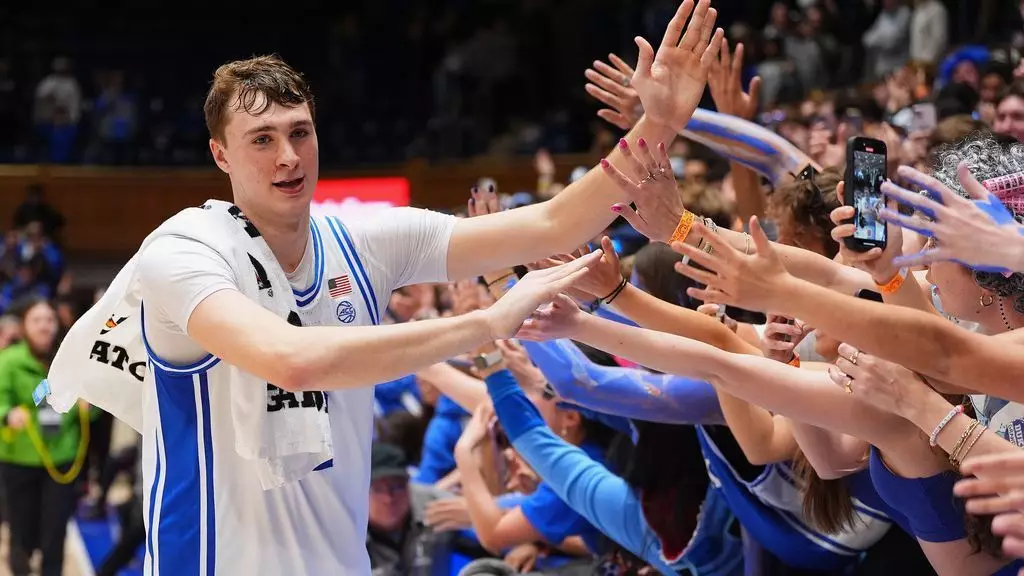In a world dominated by immediate gratification and rapid success, the rise of basketball prodigies like Duke’s Cooper Flagg serves as both inspiration and a cautionary tale. Flagg, a projected No. 1 pick in the NBA draft, recently left the court of Cameron Indoor Stadium after a commanding victory over Wake Forest, during which he scored 28 points, leading his team to an impressive 93-60 win. As enthusiastic chants of “One more year!” echoed throughout the storied arena, one couldn’t help but wonder: Is modern college sports unintentionally damaging the potential for authentic player development?
Cooper Flagg’s electrifying performance may seem like the epitome of collegiate excellence, but it underscores an urgent need to rethink the pressures placed on young athletes. Flagg, while insisting he was “living in the present,” cannot escape the looming expectations that come with his talent. With coaches, fans, and pundits privy to his nearly inevitable transition to professional basketball, the line between youthful exuberance and suffocating pressure blurs significantly. One game, albeit filled with emotion and fire, should not define a career that still holds the promise of growth.
The conversation surrounding Flagg often rotates around his immediate success and NBA potential—rarely does it shift toward his long-term legacy as a player. Leaving the court for what may have been his last game at Cameron, Flagg reflected fondly on his time at Duke, highlighting his achievements and team connections. Yet, how much of this will be remembered five to ten years down the road? If Flagg harnesses his talent with the singular goal of impressing scouts or achieving media adulation, he risks leaving his true identity behind, one that isn’t solely defined by statistics or draft predictions.
Cooper Flagg’s selflessness on the court is commendable. He emphasized that his teammate Sion James’ dunk against NC State was a highlight that reflected the essence of teamwork rather than personal glory. However, this selflessness must not come at the expense of personal ambition. The distinguishing factor between a good player and a great one lies in an athlete’s ability to balance their own aspirations while boosting their teammates. The dangerous notion that one must entirely subdue their individuality for the sake of the collective can stifle emerging talent—and in Flagg’s case, it could jeopardize an entire career.
With Cooper Flagg’s NBA draft stock soaring, another fundamental question emerges: Should college athletes like him feel an obligation to return for another year or embrace the financial security that a professional contract could bring? While college sports are touted as avenues for skill development and education, the reality is often different—athletes face pressure to leap into the professional sphere quickly, often without fully developing their skill sets. It’s a system that promotes a win-at-all-costs mentality rather than nurturing athletes through critical stages of their career and personal development.
As Flagg addressed the crowd post-game, he offered a hint of nostalgia: “I’ve loved every single minute of being here.” Yet that sentiment sits uneasily against the backdrop of his looming decision. What does it say about our current culture if the prospect of leaving behind an exceptional collegiate experience is eclipsed by a lucrative contract? The enigma of Flagg’s future encapsulates not only the pressures on individuals to maximize their talent but also asks society to reconsider how we define success in sports.
Duke may be “the best place in college basketball,” as Flagg suggests, but it also presents an illusion of safety and comfort that can never replace the chaotic unpredictability of the professional landscape. The allure of playing in a historic venue should not overshadow the realities of transitioning from college to the pros. Nostalgia for the college atmosphere runs high, but for many young athletes, the risks of staying behind can outweigh the rewards of gradual development—or worse, stagnation.
Flagg’s time at Duke will undoubtedly leave an impact, but the narrative surrounding his career can either uplift or confine. The basketball community must critically evaluate the sustainability of such pressures on its emerging stars and consider whether the rewards of instant success are worth the potential losses down the road.


Leave a Reply